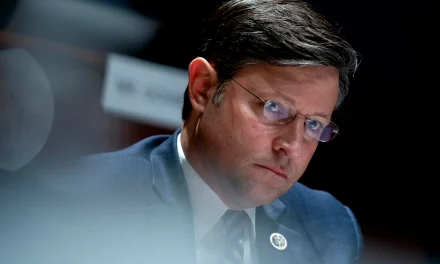Unfortunately, I feel like I wasted a small part of my life reading Ben Mathis-Lilly’s opus in Slate about how Democratic consultants are destroying the party. I don’t mind seeing someone punch people like Mark Penn and Rahm Emanuel in the nose, or jabbing Gavin Newson’s transparent presidential ambitions in the ribs. But the overall takeaway from the piece is just a lot of bitching without any serious alternatives on offer.
There’s a lot I definitely agree with in Mathis-Lilly’s laundry list of complaints. He’s at his strongest when he argues that it’s dangerous to plan on running as the saviors of the Constitution in the next election if you let polling data dissuade you from attacking many assaults on the Constitution that are taking place in the here and now. I think he also makes a worthy point that poll-tested messaging that is effective for one candidate can become obnoxious, bland and ineffective when adopted by all candidates. Think about those repetitive asks you get for money from Democratic office-seekers.
I don’t disagree with his analysis that there are downsides to the reforms in the 1970’s that weakened party machines and ultimately the two major parties themselves, and which led to the rise of an elite caste of political consultants. He’s right when he says these consultants live in ivory towers and are disconnected from the people, including the people that make up the base of their own parties. It’s true that an issue that poll tests badly in the present can test very well in the near future, or vice-versa. Recent examples, respectively, are gay marriage and trans rights. I can’t argue with the idea that a focus on real-time opinion can detract from long-term planning.
But this is all mostly a lot of bitching about the way things are without much advice for how things can be different. He suggests that perhaps the Democrats shouldn’t allow candidates with terminal cancer to run and win elections, as three did in the past election before quickly dying in office. Left unsaid is how this might be accomplished, and that primary voters are the ones who are ultimately responsible for doing this work.
Then he provides this suggestion:
Ironically, what the party could probably use most is a version of Trump who works for good rather than evil: someone who is attentive to the public mood but has a permanent and easily communicated agenda, who gets people off their butts at the state and local level, and who uses leverage to enforce the advancement of long-term goals even when it is not in the immediate interest of their personal “optics.” (This could also be a group of people, in the strong-party tradition.)
How is that for a strategy? Why not just find a charismatic leader (or small group of leaders) who can advance unpopular but meritorious ideas through their ability to inspire loyalty and base enthusiasm? I’m all for running candidates who will attract an enthusiastic following. But that’s easier said than done, and it’s not up to anyone whether such candidates will emerge when you need them. Sometimes your choice is between Al Gore and Bill Bradley, and there’s definitely not going to be a cult-following in that election cycle. In any case, asking for a savior at the top of the party is the opposite of finding a new electoral strategy for the party as a whole.
Mathis-Lilly concludes his interminable piece with this:
The [Democrats] could put their heads together to make an educated guess about what the country might look like, think like, and need out of its government in 2028, then conduct themselves accordingly for the next three years. Or they could spend several hundred million dollars to find out again that the middle class likes the phrase “lift up the middle class.” Which do you think they’re more likely to choose?
So, yeah, I get it. It’s probably a waste of resources to constantly seek out messaging advice from consultants. It’s a bad idea to shape your policies too much based on public opinion in the present, or to back away from principles because they aren’t looking popular in the latest survey. But who are these people that are supposed to “put their heads together” and predict the future? How are they supposed to arrive at some consensus on what the country might look like and the country might need in 2028? How is that consensus going to be conveyed to the party’s officeholders and candidates?
And, what if, after all this brilliant strategizing, the party base instead chooses “a version of Trump who works for good rather than evil” who has completely different ideas about where the country is and what it needs? Shouldn’t everyone have just waited for this person to emerge and tell them what to do?
I don’t see the beef here.
I’m not arguing that the status quo is working. That’s not my point. But I don’t see a coherent vision or alternative presented at all.
One thing that I think it’s important to keep in mind is that Trump’s success has been based almost exclusively on throwing out any idea of some broad party consensus. He captured the Republican Party by eviscerating its leaders. He brought new people into the party by taking positions that defied years of party orthodoxy and message discipline. He didn’t fix or save the GOP as much as he created a new party for new people.
Maybe the Democrats will soon go through a similar metamorphosis. I can envision a party that leaves its social liberals behind in favor an economic populism that plays well in small towns and rural areas. But I don’t think social liberals want to be willing participants in crafting the strategy that makes that happen anymore than conservative foreign policy interventionists wanted to bring Trump to power in their own party.
I think the answer here is not to replace one elite based on a consultant class with another elite that puts its “heads together to make an educated guess about what the country might look like.” The answer is to let the people, not the elites, decide things for a change. The Democratic Party can’t fix this. It doesn’t have the power to fix it. But the people can fix it by rallying around candidates whose messaging is derived from their own experience in their communities rather than messaging brought from on high.
Mathis-Lilly hints at something like this when talking about former Washington state governor Jay Inslee:
His style of data collection, though, is often more art than science. “I’m out talking to people and listening to them where they live. I’m in schools, listening to teachers and parents, I’m in homeless camps, listening to people. The office is not the place where you’re going to be able to read people’s feelings.”
This is the opposite of a national or party-wide strategy. That’s because the people in one district or state are likely to be different than the people in other districts and states. To be sure, we can find commonalities. But the idea here is to let candidates do their own research. And that’s a perfect strategy when the voters are primarily focused on a local or state election. But when they’re focused on a presidential election, the message really comes from the top, and no one can predict who the nominee in 2028 will be or what kind of message they might have. Pretending otherwise is a fool’s errand.
Of course, the party will not follow this advice for one simple reason. The people who control the party and its pursestrings have jobs to do, and they’re not going to decide that the best way to go is to leave all the decision making to a faceless horde. They’ll do all the polling and make all the messaging and fundraising decisions right up to the moment that a nominee emerges who will have their own ideas that may or may not be compatible.
Before we get to that stage, however, we have the midterm elections. And my advice to Democratic candidates is to spend less money on consultants and more on listening to people in their own constituencies. On that, I agree with Inslee, and with Mathis-Lilly.
As for the rest of us? We shouldn’t purity test these candidates. They will only represent us indirectly, and if they’re doing their research correctly, they’ll be running on giving their constituents what they want. If the plan is working correctly, there won’t be one national message, because there isn’t one national message that is winning.
Most of us won’t follow this advice either, because most of us have non-negotiable things we don’t want to see violated by members of our own party. That’s just the way it is.








All of this, yes.
Adding: It’s a category error to put the responsibility for the Democratic party’s messaging/issues/agenda solely, or even primarily, on consultants and top elected officials. Schumer and Jeffries have their jobs because they’re good at tending to the unity of their caucus in the Senate and House. That requires a very important set of political skills.
It’s also a very different set of political skills than those required for a charismatic orator or for a presidential candidate. We didn’t get a 1965 Voting Rights Act because Lyndon Johnson was a masterful legislator (though he was) or because he could give a great speech (he could).
But after the 1964 Civil Rights Act, Johnson and virtually all other Washington Democrats felt like they’d “dealt with” civil rights, and now it was time to move onto other planks in the party platform. It was Bob Moses and SNCC who organized the Mississippi Freedom Summer, and Amelia Boynton (Dallas County Voters League), Bernard Lafayette (SNCC), Dr. King (SCLC) and their organizations working together on what became the Selma-to-Montgomery March in early 1965 that forced the Democrats’ hand.